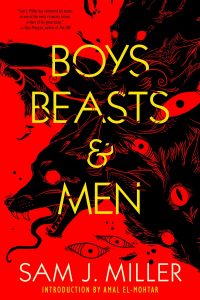Paul Di Filippo Reviews The Whole Mess and Other Stories by Jack Skillingstead
 The Whole Mess and Other Stories, Jack Skillingstead (Fairwood Press 978-1958880128, trade paperback, 334pp, $20.95) November 2023
The Whole Mess and Other Stories, Jack Skillingstead (Fairwood Press 978-1958880128, trade paperback, 334pp, $20.95) November 2023
Reading Jack Skillingstead’s second story collection drives home two things:
One: short stories remain the essential mode whereby fantastika can experiment and develop, while delivering exquisitely compact and powerful aesthetic experiences, much more so than the vast majority of novels, however competent and enjoyable the longer, baggier works might be. (If one attempts to count the novels that truly revolutionized the field, one comes up with a scant handful: The Stars My Destination; Starship Troopers; The Ophiuchi Hotline; Neuromancer; Perdido Street Station… Whereas the number of seminal, ground-breaking short stories is practically endless.)
Two: it takes a Master to fully exploit these potentials of the medium.
And let there be no doubt, Skillingstead is one of those Masters. Every offering here is stamped with ambition, skill, and a desire to connect at the body-mind-heart-soul levels. The reader will leave the final pages of this volume feeling that their senses and mind and conception of what the genre can be have all been expanded.
I might almost suggest reading the last item in this book first. It’s an essay called “The Writing Life”, and recounts the author’s “early years of bitter struggle,” to employ the classic phrase used by Bruce Sterling. It will reveal the decades of hard work and persistence that brought Skillingstead to the high plateau he now occupies, reaffirming the lesson that talent without dedication leads nowhere.
But of course, going straight to the stories will show you the same theme. So let’s do so.
What if a Lovecraftian apocalypse (lots of tentacles in play) could be triggered by the simple but inadvertent completion of a mathematical equation? You’ll find out the answer in “The Whole Mess”, wherein a mathematician named Dunn is tricked by a creepy cultist into destabilizing the whole multiverse. His hegira across the timestreams is dizzying. His chance-tagged associate, a woman named Lisa, offers a great common-woman perspective. We should take notice of Skillingstead’s fascination with the multiverse—obviously a hot topic these days—since it will crop up again and again.
“Mine, Yours, Ours” examines a near-future where the market for organ donations has been recast along supposedly more equitable lines. But it’s a social schema that causes our protagonist Emily much moral angst.
Written with Burt Courtier, “Assassins” follows the evil doings of a hacker named Sonia who specializes in nastily disrupting a shared virtual reality. Her comeuppance is unpredictable and satisfying.
Ascended aliens known as the Kabbhan live discreetly behind the surface of reality, emerging only when humans push certain boundaries. In “The Sum of Her Expectations”, such a rogue human is a somewhat bratty gal named Amrita, who insists on visiting the forbidden planet Trappist-1e. Solving her self-caused problems involves a reluctant deep dive into her own memories. Skillingstead conjures up some great aliens in both the Kabbhans and the builder-bots of Trappist-1e.
“Destination” finds our corporate flunky Brad forced to participate in a loony morale-building activity that almost gets him dead. Will it be possible to return to the cube-farm after what he’s experienced? A kind of satirical Pohl & Kornbluth vibe inheres in this piece.
The spirit of PKD hovers happily over “Dream Interpretation”, another multiversal extrapolation. Which reality is true for David Grant? The one where he’s a well-off psychiatrist, or the other option, where he’s an underpaid social worker? Could both lives be the work of an alien artifact? PKD’s VALIS at work.
Simple yet tragically powerful, “Einstein’s Theory” is a straightforward counterfactual charting the stymied life of the genius of relativity, now enmeshed in mundanity and despair. Not even heavy doses of absinthe might serve to startle him awake.
Is female astronaut Casey the only living human on Earth? (Of the people in the lunar colony, we know not.) And what are the androids known as Surrogates hiding from her? “The Last Garden” exemplifies another of Skillingstead’s core concerns: the end of civilization, brought on by circumstances either beyond or within our control.
Using biographical details from his own life, Skillingstead evokes teenage bravado and uncertainty in “Arlington”. A young airplane pilot named Paul Birmingham comes down through mysterious clouds into an otherworldly setting. The dangers he faces there are enough to fuel any complete story by a less-daring writer. But Skillingstead follows Paul out of the Twilight Zone interlude and examines his adult life afterwards.
A new drug that steals sleep and supplements hallucinations crops up in “Steel Lake”. We’d be straightforwardly in the territory of Ballard’s classic “Manhole 69,” except that we also get a fleshed-out father-son dynamic.
“The Flow and Dream” recalls all those great tales of conceptual breakthroughs, as our hero, Bale, chooses immurement in a dead spaceship rather than face what lies outside.
I whiffed delicious scents of Roger Zelazny’s trademark trope of “humanized gods” in “Last Call at the Moonlight Lounge”, wherein one of the universe’s ten deities has temporarily taken on mortal form, but finds himself all at sea and seeking a way back to heaven.
Another “lonely guy in a desolate situation” crops up in “Salvage Opportunity”. This time, a fellow named Badar, accompanied only by an AI “Companion,” comes upon the crashed ship Leviathan. No survivors—save for an emotionally needy android who adopts Bandar, to the human’s disgust. But what if all three entities really need each other to survive?
Ever since at least the time of Tiptree’s “The Last Flight of Dr. Ain” (1969), the notion of unleashing an engineered contagion against the miserable human race has been a powerful trope. In “The Savior Virus”, Skillingstead adds a unique twist to the nature of the bug: “After the bombing, John Crawford’s daughter, Sarah, found God, and Crawford went to work on a weapon designed to kill Him.”
In “The Despoilers,” a fanatical father has put his daughter Allegra into a most untenable position, marooning them on a pristine alien world so as to frustrate any “contamination” by civilization. When the man’s zealotry seems poised to take the life of an intruder, Allegra must overcome inertia and filial bonds to do what she believes is right.
A bleak post-apocalypse scenario animates “The President’s Drone”, a hitherto-unpublished piece. In a USA destroyed by politics, a cybernetic representative of the final President serves as trophy and harbinger and symbolic vessel of all that was lost—and what might yet come.
My absolute favorite story is the penultimate one, “Straconia”. It’s akin to, and on par with, Will Self’s great novel of the afterlife, How the Dead Live. Our hapless hero Frank is kicked out of our dimension, willy-nilly, and finds himself living a bardo existence in the weird and harsh endless city named Straconia. His grim education and his transformation from nebbish to striver and survivor is utterly engrossing.
Much in the manner of Heinlein and Andy Weir, “Tribute” charts the attempt by some bold and visionary types—mainly the astronaut Karie Chen, a lovingly drawn figure—to revive the dead space program and effect a landing on Mars. Full of corporate machinations, the landing does not go quite as anticipated.
Throughout all these tales, Skillingstead’s meticulous prose delivers just the right mix of poetry, tactility, speculation, and description. He never strains for his effects, but always finds just the right syntax and vocabulary and objective correlatives to convey what the reader needs to know.
Frank’s room contained a bed, a toilet, a built-in lamp, and a sink. On a little shelf next to the sink there was a plastic drinking cup. There was a door. Frank waited a minute after his escort left then tried the door. It opened. In Straconia, always, you had freedom of movement, if not consequences. He stepped into the corridor. Faintly, the hard soled shoes of his escort clocked on the cement floor, growing fainter, until silence took over.
Frank dreamed of Janet grocery shopping. In the produce department she selected nectarines for her basket, holding one, putting it back, picking up another, evaluating them for ripeness. Frank was present only as an unseen and unmissed observer. Sometimes people like Janet come to Straconia, people who think they don’t belong in their lives. Then something changes, and they never come back again.
Frank awoke with the weight of grief on his chest.
The reader may happily avoid Frank’s fate by plunging into this wise book and becoming further enlightened about the human condition, as seen through Skillingstead’s unique lens.
 While you are here, please take a moment to support Locus with a one-time or recurring donation. We rely on reader donations to keep the magazine and site going, and would like to keep the site paywall free, but WE NEED YOUR FINANCIAL SUPPORT to continue quality coverage of the science fiction and fantasy field.
While you are here, please take a moment to support Locus with a one-time or recurring donation. We rely on reader donations to keep the magazine and site going, and would like to keep the site paywall free, but WE NEED YOUR FINANCIAL SUPPORT to continue quality coverage of the science fiction and fantasy field.
©Locus Magazine. Copyrighted material may not be republished without permission of LSFF.







